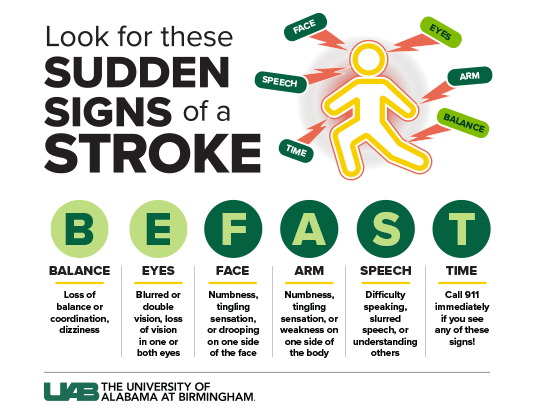 Study results showed longer duration of hypertension is related to higher risk of stroke, higher average systolic blood pressure and a need for more classes of antihypertension medication.Nearly half of adults in the United States have hypertension, or high blood pressure, which is the leading risk factor for stroke. While the link between hypertension and stroke risk is well studied, little is known about how long someone’s having hypertension affects these risks.
Study results showed longer duration of hypertension is related to higher risk of stroke, higher average systolic blood pressure and a need for more classes of antihypertension medication.Nearly half of adults in the United States have hypertension, or high blood pressure, which is the leading risk factor for stroke. While the link between hypertension and stroke risk is well studied, little is known about how long someone’s having hypertension affects these risks.
Researchers at the University of Alabama at Birmingham evaluated the association of hypertension duration on the management of hypertension and stroke risk. Results, published in the American Heart Association journal Stroke, found an increased risk of stroke and a need for more classes of antihypertension medications the longer one has high blood pressure.
The study was part of the REasons for Geographic and Racial Differences in Stroke study, a national cohort study sponsored by the National Institutes of Health.
“Treating high blood pressure is a major focus in preventing strokes. However, our study suggests we should place more emphasis on preventing high blood pressure from developing as long as possible,” said George Howard, DrPH, Distinguished Professor of Biostatistics in the UAB School of Public Health and lead author. “Data showed delaying the onset of hypertension can significantly lower one’s stroke risk and help mitigate the need for numerous medications.”
Hypertension is defined as a systolic blood pressure greater than 130 mmHg or a diastolic blood pressure greater than 80 mmHg. The average age of hypertension onset in the United States is mid-40s. However, hypertension rates vary among sex, race and geographic location, with men, Black adults and those in the Southeastern United States, also known as the Stroke Belt, having increased risks.
The study followed 27,310 participants from the REGARDS cohort. The average age was 65 years old. Compared to participants with normal blood pressure, even given the blood pressure level and the number of medications used to control the blood pressure, the increased risk of stroke in participants with hypertension were:
- 31 percent for a duration of five years or less
- 50 percent for a duration of six to 20 years
- 67 percent for a duration of over 20 years
Additionally, the data showed those who had hypertension for more than two decades were taking 2.28 classes of medications on average, compared to 1.68 classes for those who had hypertension less than five years. Secondary findings showed the average systolic blood pressure was higher in groups with longer hypertension duration.
 Learn how to identify a stroke with these signs.
Learn how to identify a stroke with these signs.
Click image to enlarge.
Graphic: Jody Potter“Fortunately, there are known lifestyle interventions that can delay, and possibly prevent, the development of high blood pressure,” Howard said. “Many of these interventions are small steps individuals can implement in their daily lives.”
To lower blood pressure, and prevent hypertension, the American Heart Association recommends:
- Eating a healthy diet
- Limiting alcohol intake
- Maintaining a healthy weight
- Managing stress
- Staying physically active
- Not smoking
- Taking proper medications
- Working with a health care professional to monitor blood pressure